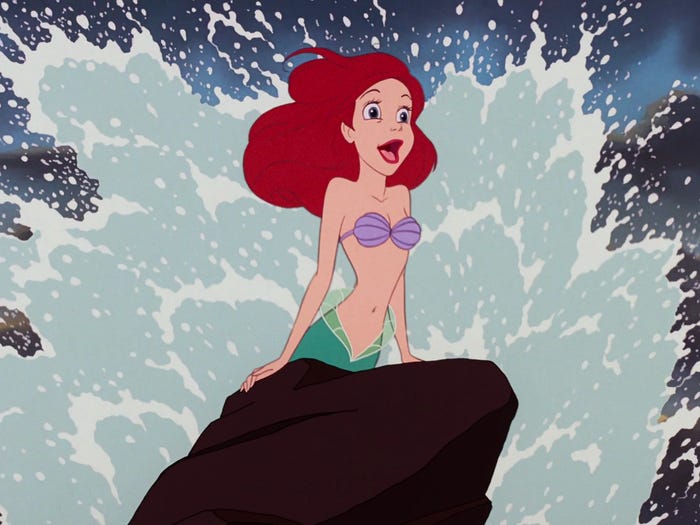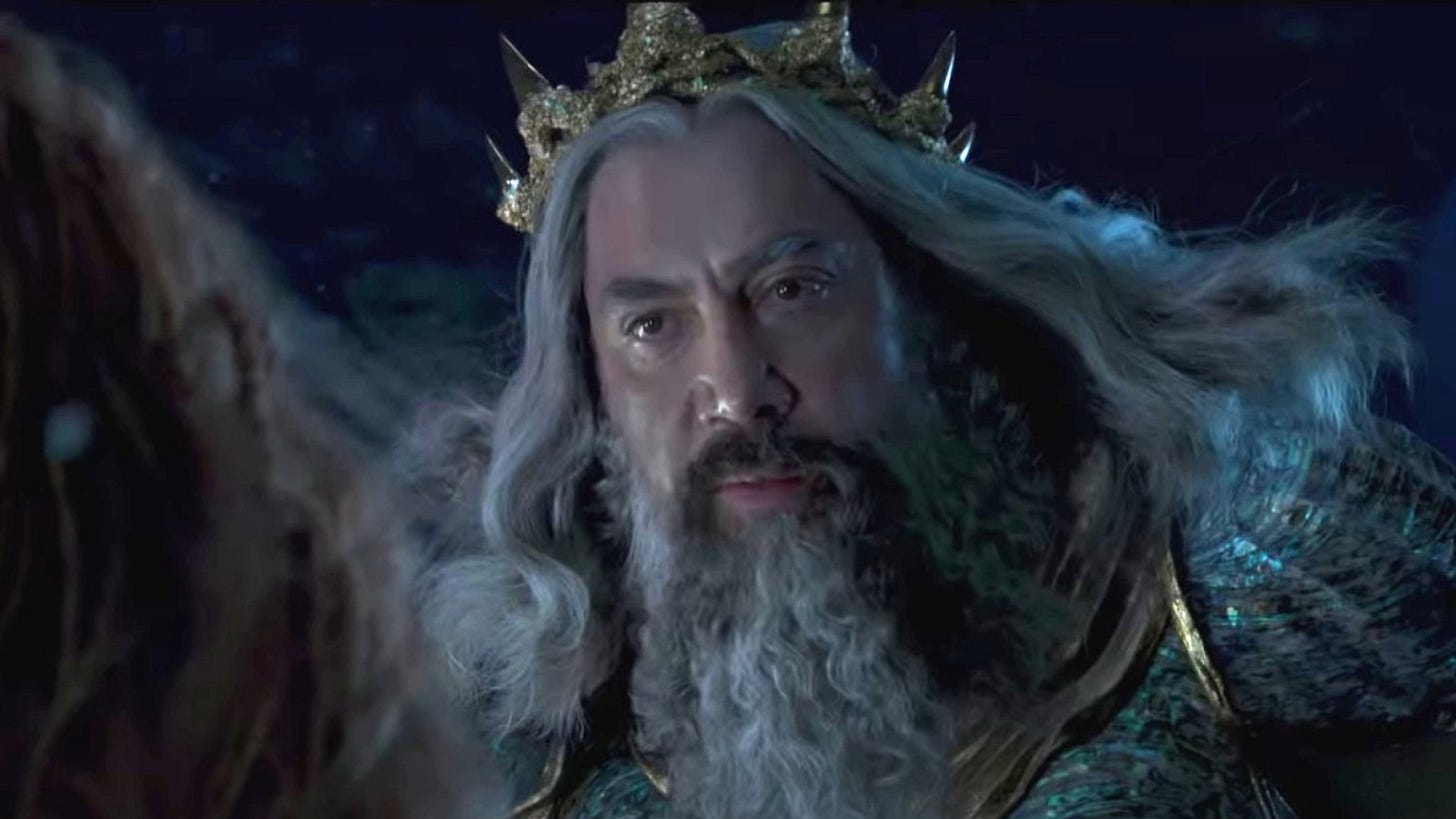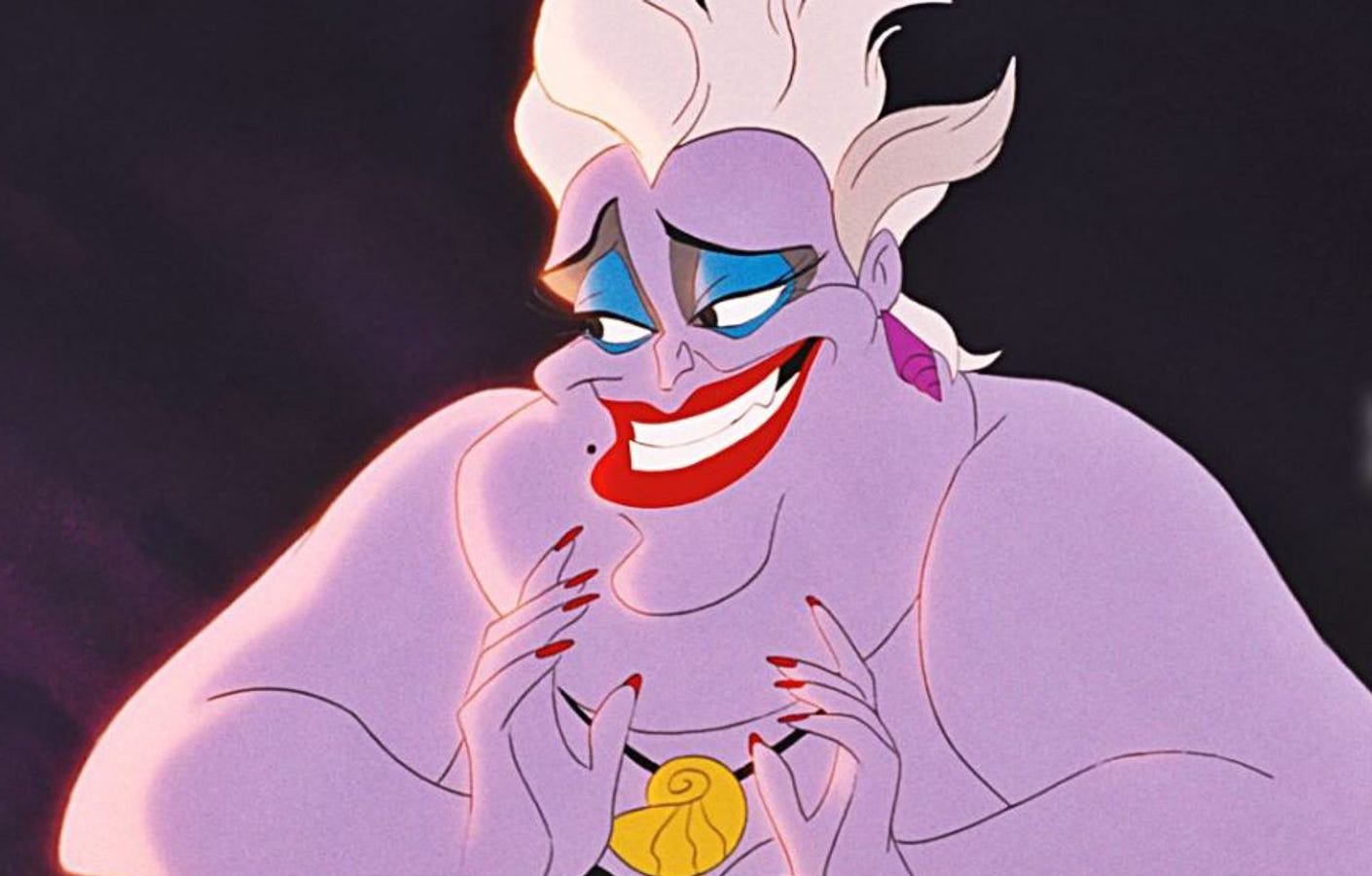The Little Mermaid
I don't know when, I don't know how, but I know something's starting right now.
(Cover photo by thecrownedheartlove on IG)
I need you to bear with me this week. I am still in a euphoric state post-eras tour night 1 at Metlife Stadium, where we got Getaway Car as a surprise song, Ice Spice as a surprise guest, and the premiere of the Karma music video. If you've ever been to a Taylor Swift concert, you know no one puts on a show quite like her. But this week's newsletter is actually inspired by what I did the day before Eras tour. I went to see the new live-action The Little Mermaid Thursday afternoon with high expectations and planned on raving about it in this newsletter.
Unfortunately, I did not love it as much as I thought I would. (Though, I must give a shoutout to the Jodi Benson cameo!!) I've seen a lot of mixed opinions, but I think Wesley Morris' review for The New York Times sums up my thoughts pretty well. If there's one thing I try hard not to be, it is a perpetual hater. Instead, I aim to be someone who can enjoy things and let other people enjoy things without harshly critiquing them, which is why I'm not turning this newsletter into a movie review where I tear apart the years of hard work filmmakers and actors put into the film.
I actually thought the actors did an incredible job embodying the Disney characters. The role of Ariel fit Halle Bailey like the glass slipper fit Cinderella. She has a childlike innocence that awakened in her as the Disney princess, and Jonah Hauer-King brought life to Prince Eric, transforming him into a man of substance instead of a golden retriever boyfriend who plays the flute at the window for most of the animated film, waiting to hear the voice he fell in love with so he can marry the woman it belongs to without knowing much about her at all.
Before the live-action film premiered, I revisited The Little Mermaid (1989) and wrote an analysis of why I don't think it deserved a lot of the criticism it got in the past. Ariel is a more powerful and independent character than anyone in the last 33 years has given her credit for. I wouldn't sum Ariel up as a girl who gave up her voice for a man but a headstrong woman who went against what her dictating father wanted for her so that she could live on land and experience life instead of being confined to the ocean.
Unfortunately, I think the live-action film lost this message. While it's important to listen to criticism and do better in the future, it felt like The Little Mermaid (2023) spent too much time correcting aspects of the original which received backlash that it lost its plot and many of the original's strengths. When I rewatched the animated film, this was my main takeaway: The Little Mermaid has been misconstrued. It was never about Prince Eric.
I've always found "Part Of Your World" a misleading title for Ariel's The Little Mermaid ballad. Throughout the whole song, Ariel sings, "wish I could be part of that world." The word "your" doesn't come in until the reprise after she rescues Prince Eric. Maybe the misleading song title is why so many people see The Little Mermaid as a deeply sexist film sending misogynistic messages to young girls. While the Disney film isn't perfect and has its many flaws, I think its message is misunderstood. The Little Mermaid was never about Ariel giving up her life for a man she doesn't know, and the argument that Ariel served no purpose but to get a prince to fall in love with her seriously undercuts her character.
Ariel actually has a lot of strengths. From the get-go, Ariel has more depth than the princesses that came before her. The Little Mermaid, released in 1989, was Disney's first princess film in thirty years, and in comparison with Snow White, Cinderella, and Aurora from Sleeping Beauty, Ariel is the Gloria Steinem of Disney princesses. When The Little Mermaid opens, Ariel's sisters are performing a show for their father, and he's displeased to notice Ariel is absent from her big debut.
Ariel forgot all about the performance because she was doing what she does best, collecting thingamabobs with Flounder. Ariel is an adventurous, free spirit and often the one lending her courage to her yellow fish friend. The Little Mermaid introduces Ariel in the movie by having her fight off a shark determined to make her and flounder his next meal. That kind of female badassery hadn't been showcased by the other princesses. Disney knew they had a lot of correcting to do, and one of their attempts came when Ariel was the one to save Prince Eric from drowning, proving women can be heroes too.
Though before Ariel ever lays eyes on Eric, the man she allegedly gives up her life for, she is already yearning for a life above the sea. When Ariel sings "Part Of Your World," she's fed up with her father trying to control her life and take away her freedom. Her ballad is an expression of her frustration with a powerful man putting constraints on her and holding her back from the life of her dreams.
That's a message most women resonate with. There's even a scene at the end of the song where Ariel reaches for the world above before sinking back down like she's metaphorically attempting to break through the glass ceiling, except it's just a liquid barrier that she holds herself back from breaking through out of fear of disobeying her father's orders.
I noticed the live-action film aimed to correct King Triton's character, hoping to gain some sympathy from the audience so they'd see him as a worried father who lost his wife to the human world and is terrified of losing his daughter, too, instead of a controlling patriarchal figure.
While this made it easier to forgive him at the end of the film when he finally sets Ariel free, it also diminishes one of the many themes in the film. King Triton, while not as villainous as Ursula, is still one of the people holding Ariel back from her full potential and acts as a metaphor for all the ways women are held back in society. I think in an effort to correct the sexist dynamic between King Triton and Ariel, the live-action film actually ruined one of its most powerful metaphors.
When Ariel does meet Prince Eric, it's after she's performed "Part of Your World." Instead of him being the sole reason she left her whole life behind, he was more like a sneak peek into what the human world had in store. Seeing him was the little push she needed to move forward with her dream of living on land.
In order to follow through with her plan, she visits an unlikely helper, Ursula. The dynamic between Ariel and Ursula is toxic and one of the more problematic elements of the film. Ursula's burning jealousy and desire to sabotage Ariel's life wouldn't work in the modern world that's become equipped with phrases like "women supporting women" or "when women support each other, incredible things happen." Clearly, Ursula didn't get this memo.
The live-action film left Ursula mostly the same, and I think, despite initial criticism, Melissa McCarthy put on a brilliant performance. However, I strongly disagree with claims that Ursula's lyrics in "Poor Unfortunate Souls" sent negative messages to young girls as her villain status immediately discredits everything she tells Ariel. After all, Ursula's words weren't untrue. We do live in a society that tries to silence women, and the outdated belief "women should be seen, not heard" is enough proof of this. Ursula was a manipulative opportunist, but she was no liar.
It's also often forgotten that Ursula's appearance and demeanor were inspired by a Baltimore-based drag queen from the 1980s named Divine. Songwriter Howard Ashman was inspired to base the sea witch on Divine because, as MovieWeb put it, "As another gay man from Baltimore, Ashman was connected to Divine culturally, understanding his crude humor and exaggerated exploration of womanhood and beauty." Many aspects of Ursula that have been labeled sexist are actually staples of the drag community.
Plus, at the end of the film, Ariel gets her voice back and lives happily ever after in the human world, proving Ursula wrong. There are men in the world who want to hear what women have to say, and Ariel chose one who does, which is a great lesson on self-respect, teaching young girls what they should accept in a relationship.
Another big criticism The Little Mermaid gets is that the film puts too much importance on Ariel's appearance, and Prince Eric only falls in love with her because she's beautiful. Not only do I disagree, but it's undeniably inaccurate. Eric falls in love with Ariel seemingly faster than she falls in love with him, all because of the sound of her voice, the very thing Ursula claimed wasn't valuable in the human world. Eric fell in love with Ariel for her talents and passions, and I think that's a beautiful thing to love about someone.
When Ariel comes to stay at his castle, he doesn't immediately want to marry her because he's still looking for the girl with the beautiful voice. He's arguably more desperate than Ariel was for his love. At least Ariel took action on what she wanted. Eric just stares out the window and plays the flute waiting to hear the voice again. Prince Eric only becomes interested in marrying Ariel when she gets her voice back, which actually sends a powerful message to young girls about the importance of having a voice. It's the thing that makes you unique and irreplaceable.
The live-action film also adjusts a lot about Ariel and Prince Eric's love story. I appreciate that Ariel and Eric spend more time together in the live-action film, so when they do end up together in the end, they at least kind of know each other. Whether or not they get married like they did in the animated film is left open to interpretation. Unfortunately, I felt like some of the love story was lost in an attempt to make Ariel more independent and less reliant on a man.
It took Disney decades to create a princess with a purpose outside of marrying a prince. I think Ariel was a step in the right direction, even if she had some flaws. I understand why Disney wanted to change the message of the film, where even after meeting Prince Eric, Ariel still wants to go to the human world for herself, not to chase down a prince. At the same time, I always loved how giddy and excited Ariel got over Eric, and the way her sisters and father shamed her for it further defined the contrast between her and her family and why she wanted to get away so badly.
One thing I can't defend is that Ariel had to wait around for Eric to kiss her before she could speak again. At least, that was the case until Vanessa dropped and broke the necklace with Ariel's voice in it, and she was able to retain it that way. Disney just had to keep up with their true love's kiss tradition. I see how this could be degrading, but I don't think it undermines all the other positive messages in The Little Mermaid.
The live-action film couldn't really correct this one since it would entirely change the plot of the beloved story. But it was probably better off they left it alone since they'd already made so many other adjustments that didn't necessarily work.
I stand firm in my belief that Ariel never wanted to be part of Eric's world but part of the human world. Ariel is opinionated and has her own life goals, and Eric's only a fraction of the life she wants for herself. The Little Mermaid, with all its problematic aspects, is not a story of a woman who gives up her life and voice for a man but a woman who breaks free of all constraints so she can see the world, find her voice, and prove everyone who tries to hold her back wrong, and that's a compelling story to tell.
The animated film ends with Ariel marrying Prince Eric as the background characters perform the "Part of Your World" finale song. I'm not sure why the song was reduced to an instrumental at the end of the live-action film, but this was one of its smaller disappointments. The live-action film copies the animated film's ending with Ariel and Prince Eric sailing away, except this time it's because Eric wants to explore the ocean, which his royal adoptive parents were wary about him doing.
This strengthens his connection to Ariel as they both felt constrained by their parents. However, the ending also seems to contradict everything the live-action film aimed to correct. Why, when Ariel was finally free to live on land, did she return to the ocean just because it was what Prince Eric wanted?
The Little Mermaid (1989) had its faults, but I still believe it was mostly full of positive and empowering messages that have been misinterpreted for the last 33 years, and there was a better way to revisit the film that stayed true to its core messages while correcting what no longer works three decades later.
I still encourage everyone to see the live-action film, support Halle Bailey, and come up with a conclusion on their own. I respect all the work that went into the live-action film, but as many other Disney fans have requested, it might be time to end all the live-action films and leave well enough alone.










